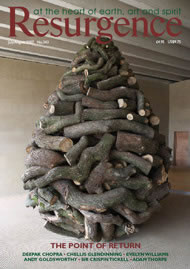THE TIMES WE live in have been called the End Times. They are marked not only by the social and ecological deterioration we know too well, but by a long view – whether it’s astronomical and geological data put together to reveal the story of the planet’s formation, or genetic studies applied to revelations about the history of migration.
Now here comes the longest glimpse of humankind yet – anthropological, palaeontological, archaeological and geological knowledge assembled by a historian. After working as an editor at The New York Times Magazine, Kirkpatrick Sale has spent his career applying his grasp of human events to efforts, trends and repercussions that are normally hidden from view: the ecological impacts of Christopher Columbus’s arrival in the New World; the systemic analysis of industrial society developed by 19th-century Luddites; bioregionalism as a guide towards human survival.
Seemingly indefatigable, Sale is now offering his most sweeping vision yet. In exploring the disturbing conundrum of the human urge to violence and domination, he shows that, before today’s Homo sapiens emerged, the 1.8-million-year-old Homo erectus lived in harmony with the natural world as a gatherer-scavenger. Beginning some 71,000 years ago, though, confrontational big-game hunting laid the ground for estrangement and a new culture of dominance distancing people from animals and making them into enemies.
The upshot, according to Sale’s thinking, was the unfolding of an unprecedented social and psychic arrangement – what we call “modern” – that found its origins in the Paleolith; not during the industrial revolution, or the days of classical empire, or even the Neolith, as so many researchers have proposed. Sale proposes that the change from scavenging to active hunting, and therefore dominance, lay in a climatic plunge in temperature some 71,000 years ago, catalysed by a massive volcanic explosion in Asia. Overnight, all living creatures – including our ancestors in Africa – were faced with the task of devising more aggressive survival methods; many did not succeed and became extinct.
As Sale implies, the change may have infused the human psyche with its first case of collective post-traumatic stress disorder. Psychic numbing, hyper-vigilance, thinking disorders, and dissociation of mind from body may have become endemic, laying the ground for desperate physical means of making ends meet, as well as for rationalising philosophies of isolation and superiority.
Rumblings of dissatisfaction with Sale’s ideas have preceded the publication of the book. Academics who reject challenges to neat categorisations of knowledge or forays of researchers outside their designated departments; primitivists who champion hunting as the archetypal human experience; native people whose claim to origins may differ or whose use of hunting, agriculture or battle may unexpectedly place them on Sale’s trajectory towards modernism – and yet the argument is so well documented, so well thought-out, so compelling, that its real threat is to become one of the truly important visions of our times.
Ultimately the response that Sale conjures in the reader may be compassion. In his view early humans did not turn to murder and massacre, conquer animals and plants, invent warfare or develop a narcissistic identity because they were inherently nasty; they did so because, in the context of extreme climate and ecological challenges, they were trying to survive.
The compassion Sale elicits is also for us inhabitants of these precarious times. Within each of us and within the diverse cultures we hail from lie threads and qualities, urges and knowings that hark back to our common heritage as Homo erectus. Love of the natural world. Sharing. Caring. The urge to gather and scavenge. Morality. Biocentrism. Feelings of spiritual oneness. Mindfulness. Communalism.







